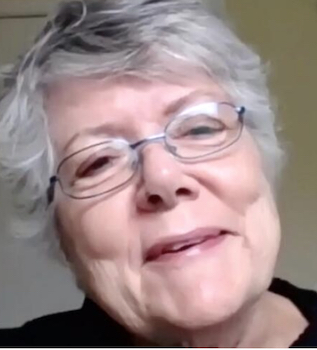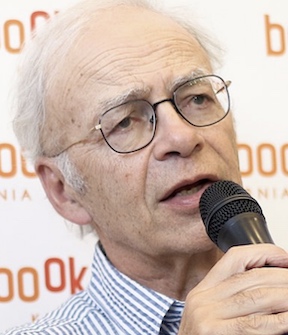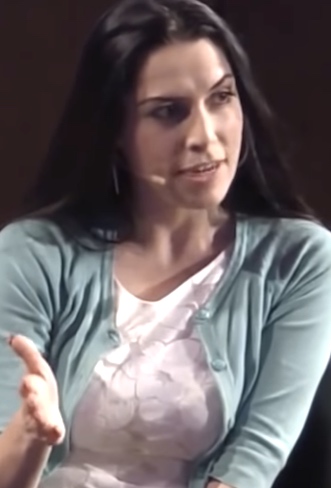professors
Sally Roesch Wagner

On this date in 1942, Sally Roesch Wagner — historian, author, educator and activist — was born in Aberdeen, S.D., the state’s third-largest city (pop. 25,000) — to conservative Republican parents who were Congregational Church members.
Wagner had a brother and a sister. The family was upper-middle class and socially prominent. Her father, a banker, had German-Russian roots, and her mother’s father served three terms as Aberdeen mayor. “My mom was a brilliant, creative woman who was locked into the impossibility of actualizing herself in the 1950s and suffered as women did during that time. Seeing her caged in that way and seeing the potential that she had when she could escape slightly from it, said to me I will never be that.”
Still, her mother was an engaged parent and headed a statewide Republican women’s group. “She raised me with an egalitarian sense of the worth of human beings without putting price tags on them, which was an incredible gift. I didn’t realize it at the time.” (Veteran Feminists of America interview for Pioneer Histories Project, December 2021)
“My father was the patriarch of the family, and that was the way it was supposed to be. My mother should have been out there doing all kinds of things in the world, and instead she was on Valium. How many women during the ’50s were on Valium?” (Undated interview, Binghamton University Libraries)
Wagner got pregnant at age 17 soon after high school in 1960. At that age in South Dakota and without parental support, abortion was not an option. She married and had another child before long. They had moved in with her husband’s parents in Sacramento, Calif., where she attended Cal State. “I didn’t know about socialism, took a class in economics and realized, oh, my God, I’m a socialist, and my husband was a raging capitalist, and the differences just became greater and greater. He died a couple of years ago, a total Trump supporter, an alcoholic and a non-viable parent, almost from the get go.” They had divorced in 1965. (Ibid., Veteran Feminists)
“Bob Dylan’s ‘Like a Rolling Stone’ got me out of my marriage. That was my support system. ‘Once upon a time, you dress so fine. Threw the bums a dime in your prime, did not you?’ That was my song. This is the song about a white, middle-class married woman leaving her life behind in a moment when getting a divorce was a travesty in my family and among everybody I knew.” (Ibid., Binghamton)
Wagner earned bachelor’s and master’s degrees from Cal State and in 1975 received a doctorate in women’s studies from UC-Santa Cruz. She actively protested against the Vietnam War and on behalf of women’s liberation and was arrested twice for civil disobedience in the early 1980s while dressed up as suffragist Matilda Joslyn Gage. On occasion she also performed as Elizabeth Cady Stanton.
She called the first arrest a “birthing gift” to her grandson Michael, holding his photo while demonstrating at the Seneca Army Depot in New York to protest sending armaments to Europe. The next arrest was on Native American land at a Nevada test site for nuclear weapons. Both charges were eventually dropped but she was strip-searched and handcuffed in detention.
She helped found the women studies’s program at her alma mater Cal State-Sacramento, where she taught for several years before teaching at Mankato State University in Minnesota from 1981-1985. Wagner began work as a visiting professor at Syracuse University in 1997, teaching classes on women’s suffrage and other activist history. She was named Humanist Heroine of the Year by the American Humanist Association in 1992.
She received a National Endowment for the Humanities Fellowship and grant to research Gage. She bought the home Gage lived in from 1854 until her death in 1898 in Fayetteville, N.Y., and in 2002, she turned it into the Matilda Joslyn Gage Museum and Center. “Gage… understood that traditional Christian beliefs have shaped every aspect of women’s lives from the time of Constantine to the present day, and she insisted that they must be challenged directly.” (Feminism and Religion, Nov. 29, 2021)
When asked about priests Daniel and Philip Berrigan, who were brothers and fierce critics of U.S. militarism, Wagner said, “I think [they are] the reason I do not hold the entire Catholic Church in contempt. Examples of how even in an obsolete and corrupt institution, there can be integrity and goodness.” (Ibid., Binghamton)
She died of undisclosed causes in New York at age 82. (D. 2025)
“I became a freethinker — like Matilda Joslyn Gage — at the age of 14, reading books that she had given to her son, knowing nothing about Matilda Joslyn Gage.”
— Interview, Syracuse Woman Magazine (Feb. 27, 2017)
Peter Singer (Quote)

“Paul Krugman says Democrats need to make it clear they value faith. Is everyone caving in to this religious nonsense? What is faith but believing in something without any evidence? Why should Democrats value that? Formidable as the task may seem at present, the long-term need is to persuade Americans that having evidence for your beliefs is a good idea.”
— Peter Singer, Princeton professor of ethics, letter to the editor, New York Times (Nov. 8, 2004)
Francesca Stavrakopoulou

On this date in 1975, biblical scholar and atheist Francesca Stavrakopoulou (Stav-rah-kah-poo-loo) was born in Bromley, Greater London, to an English mother and a Greek father. “I wasn’t brought up religious at all. There were people in my family who were different flavors of Christianity, but not in a going-to-church-all-the-time kinda way. Or the bible being read every day. Just that kind of cultural Christianity that so many of us grow up with in Western society.” (What I Wanna Know online, Aug. 25, 2023)
Perhaps due to her heritage, she loved stories about Greek gods and goddesses. “And I just remember not being able to quite understand why there’s all this fuss about Jesus, because it seemed to me like this was completely normal in sort of mythological terms. Here’s a guy whose mum was immortal and whose dad was a god. So what? Why is he so special? How come this guy gets all the attention now and some of those great mythological figures from the past had disappeared?” (Ibid.)
After earning a doctorate in theology from the University of Oxford, she joined the Oxford faculty for several years before assuming a position at the University of Exeter, one she holds as of this writing in January 2025 as a professor in the department of classics, ancient history, religion and theology.
Her book “God: An Anatomy” (2021) won the PEN Hessell-Tiltman Prize celebrating the best nonfiction writing on any historical subject. It was named one of The Economist’s Books of the Year. “It’s the book I always wanted to write – to find out why this deity, out of all the ancient gods, is the one who managed to survive into the present day. I wanted to set God in his natural cultural habitat, and what we discover is that he was no different than the other gods in ancient southwest Asia,” she said in a University of Exeter post. (Dec. 21, 2022)
Penguin Random House called it “a vividly corporeal image of God: a human-shaped deity who walks and talks and weeps and laughs, who eats, sleeps, feels, and breathes, and who is undeniably male.” Stavrakopoulou believes that “very little, probably” of the Hebrew bible is historical fact, based on the contention that ancient writers had an understanding of “fact” and “fiction” very different from a modern understanding.
On Channel 4 in 2010, she posited that figures like Moses and King David did not actually exist. A former secretary of the British-based Society for Old Testament Study, she has appeared on BBC One to discuss topics such as “Is the bible still relevant?” “Is there a difference between a religion and a cult?” and “Are religions unfair to women?”
She took issue with this comment in a review by The Independent that included her physical appearance: “Clearly whoever commissioned a three-part series on biblical scholarship for BBC2 was entirely indifferent to the fact that it would be presented by someone who looks as if she’s shimmied out of one of the hotter passages of the Song of Solomon.” (The Guardian, Oct. 26, 2014)
A foul statement, Stavrakopoulou responded. “Essentially, the message is the same: Unless women dress modestly and conservatively, they look out of place in academia, because fundamentally, they don’t have the right bodies to be academic authorities. This infuriates me, and I refuse to accept it.”
In a long interview that more than amply displayed the depth of her religious scholarship exploring the mythical deities of classical antiquity as well as Christianity and Judaism, Stavrakopoulou said people were confused by her early on. “Even when I started my academic studies, when I did my first degree and then my master’s and then my doctorate and even doing postdoctoral work, people always said, ‘But you’re an atheist? Why would you be interested in the bible?’ … This collection of texts has shaped so much of our cultural assumptions and preferences and our cultural anxieties. And it just seems to me to be wrongheaded to think that an atheist wouldn’t be interested in the bible.” (Ibid. What I Wanna Know)
As a patron of both Humanists UK and Defence Humanists, Stavrakopoulou advocates for improved mental health services and nonreligious pastoral support for active and veteran military members and their families. Her husband is a former Royal Marines commando who suffered a life-altering injury while on duty. “When were you the happiest?” she was asked by The New Statesman in 2023. “The day I got married. I’m very soppy,” she answered.
She thinks the hate mail she gets, including threats of rape and death, stems from fear and deep-seated insecurity that maybe she’s right that their beliefs are mostly based on myth: “Religion is obviously terrible in all sorts of ways for all sorts of different people, but it’s not going anywhere. And so there is no point in trying to dismiss it and ridicule it, not least because not all religious people are bad, unthinking, stupid people. I know a lot of very deeply wonderful, caring, fantastic, clever people who also happen to be religious.” (Ibid.)
PHOTO: Stavrakopoulou in 2015 on London Thinks: A Scientist, an Atheist Biblical Scholar and a Vicar Walk Into an Ethical Society; Conway Hall photo under CC 3.0.
“Whether we like it or not, [the bible] matters. It’s like how Shakespeare matters, and the bible matters in that sense. So it’s a cultural icon, whether you believe it or not. But certainly, it’s not the divine word of God.”
— Interview, What I Wanna Know (Aug. 25, 2023)
